Omicron pauses the return to economic normality
- Published

The science may still be uncertain but the Omicron variant has definitively intruded upon recent stock market euphoria.
The designation as a variant of concern last week, and then further comments this morning from vaccine makers that existing vaccines will not be as effective, has caused widespread and significant falls in share prices.
So what will the economic effect be? It should be limited and that is mainly because it's clear that the UK Government and the US Government will do everything to avoid any further lockdowns.
The world awaits the health data from hospitals, first from South Africa's outbreak, and then elsewhere, about its transmissibility and severity.
The new restrictions announced here in the UK and around the world reflect real time science, and in particular an expectation that the variant takes some bricks out of the wall of vaccine immunity.
That in and of itself will have some economic impact. In the UK, real time data from restaurant reservations and online job adverts were well above the equivalent day last year. Retail footfall was just 8% below the equivalent day in 2019. Things were beginning to get back to normal, even with a considerable number of Delta cases, and a steady stream of weekly deaths.
Omicron has paused some of this process, merely by injecting a doubt that the pandemic is behind us.
The restrictions announced are not too onerous, mainly linked to the use of masks. Industry has learned to adapt to the pandemic. But at times half the economic impact of the pandemic has come from consumers voluntarily deciding to socially distance, irrespective of legal restrictions.
Already there has been a trickle of cancelled events and Christmas parties, for example, but it's important not to overstate that.
Business travel and some tourism is definitely going to be hit due to renewed quarantine requirements. Supply chain bottlenecks that are already holding back recovery are only going to be exacerbated by a wave of transmission that requires some workers to isolate.
Should hospitalisations increase however, the government could have to roll out its Plan B for the return of more stringent social restrictions. It really absolutely does not want to return to lockdowns. Past experience suggests this could hit the size of the economy in January by 2-3%. Only in those circumstances would the government renew pandemic financial supports.
On Monday, the first ministers of Scotland and Wales asked the Treasury to prepare new emergency funding packages. The Treasury said this was a hypothetical situation and that "vaccines remain our best line of defence and we'll continue to bolster our defences with an accelerated booster roll-out". In short, because they do not expect to lockdown, they do not currently expect further support packages will be required.
The data on whether the current modest measures will be sufficient won't start to be available until the middle of next month. So the uncertainty is likely to linger into next year, weighing on the economy just as it was starting to get back to normal.
The material impact of this will be to strengthen the hand of those at the Bank of England who think that rate rises can wait until February, even as inflation spikes up.
US central bank chief Jerome Powell has talked of the need for "humility", having underestimated the impact of the Delta variant last year.
So the return to normal is on hold. The immediate fate of the economy, though, depends on the hospitalisation data.
- Published30 November 2021
- Published30 November 2021
- Published30 November 2021